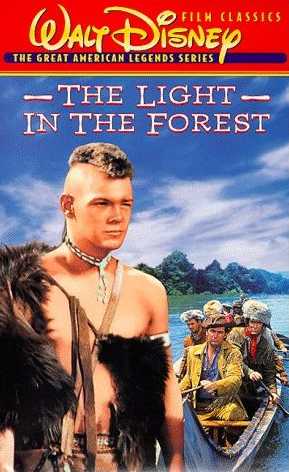This surprisingly absorbing drama, based on Conrad Richter's novel, tells the tale of the re-assimilation of Johnny Butler, kidnapped as a child by Native Americans (in this 1958 film, of course, called Indians), into the "white man's world." Reluctant and unfamiliar with his biological parents (Jessica Tandy and Frank Ferguson), he's befriended by frontiersman Del Hardy (Fess Parker, basically looking handsome and playing his popular image), also raised by the Indians and now an Army man. Johnny also meets and fancies Shenandoe--his aunt and nasty uncle's indentured servant girl, (a positively luminescent Carol Lynley, 16, in her first role), whose family was massacred by another tribe. While this is an action film set in 1764, made in the still politically insensitive 1950s, it manages not to paint stereotypes. But Light in the Forest is, more than anything, a love story. Shenandoe, terrified of Johnny initially, grows to love him. Johnny, burdened by not feeling he belongs in either world, finds solace in Shenandoe's sweet friendship. (Ages 8 and older) --N.F. Mendoza
Product Description
The year is 1764, when a peace treaty between the Delaware Indians and the British requires that all white captives be returned to their people. Johnny Butler (James MacArthur), kidnapped by the tribe when he was a child and renamed True Son, is forced against his will to return to his white family in Pennsylvania. His escort, frontiersman Del Hardy (Fess Parker) and Shenandoe, a beautiful servant girl (Carol Lynley, in her feature film debut), try to help the boy adjust to his new way of life. But the white man's injustice and cruelty drive him back to the Delawares, where even greater dangers await him!
The good
Although both sides overstepped the bounds of decency, the movie ultimately sides with the Indians. It argues for settling conflicts by negotiating treaties and then living by them.
The bad
Macarthur occasionally objects but ends up goes along with everything. He's like a typical 1950s good boy who respects authority. He's about as rebellious as (Leave It to) Beaver.
The ugly
All in all, The Light in the Forest is a more enlightened movie than some of its contemporaries. Rob's rating: 7.0 of 10.


3 comments:
Writerfella here --
When Disney's THE LIGHT IN THE FOREST opened in Anadarko, OK, in 1958, the film almost wasn't allowed to leave the theater. In those days, the huge Native contingent surrounding Anadarko would attend certain films EVERY NIGHT and the theater owner was loath to lose this level of continuous business from a very large segment of his movie-going public. LIGHT hit Kiowas and Comanches particularly hard because captives made up so much of their later cultures after EuroMan came among them. For the descendants of the Kiowan Spider Clan, LIGHT paralleled the story of Kodl-Aw-Khoy, the Red-Headed Kiowa. The filmic story may have ended differently but it made no difference as the similarities were far too striking. It rather was like seeing a living example of matters you only had been told about and then knowing that these things must have been true. The past both had been stolen and lost, but some few films managed to strike certain chords that brought it all back home again...
All Best
Russ Bates
'writerfella'
So what exactly was your collective response? Sadness? Anger? Or...?
Writerfella here --
The similarities of the film's storyline to history made for pride, sympathy, joy, and yet a bit of melancholy. It is one thing to know that your past and your future both were stolen by ineluctable forces against which you could not defend. It is quite another to see your stolen past and future portrayed right before your eyes...
All Best
Russ Bates
'writerfella'
Post a Comment